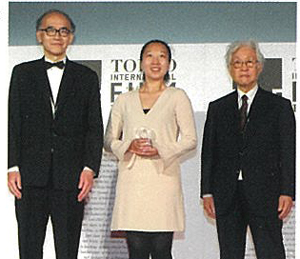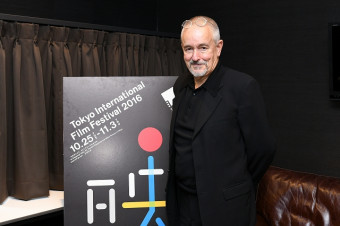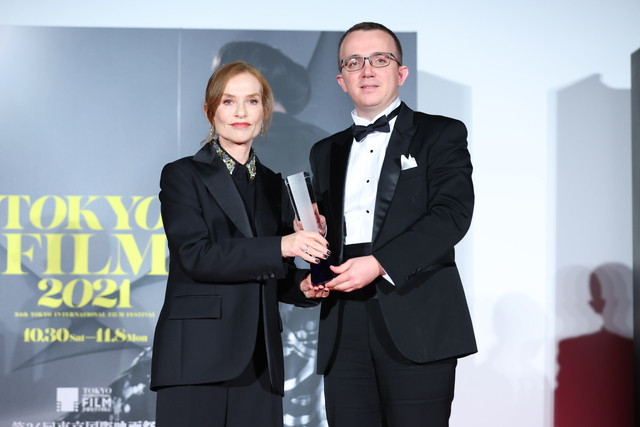
The 34th Tokyo International Film Festival (TIFF) concluded on November 8, after 10 days of screenings and special events at the festival’s new main venues in the Hibiya-Yurakucho-Ginza area. During the Closing Ceremony at TOHO Cinemas Hibiya, winners were announced for a range of awards, from the new Amazon Prime Video Take One Award for short films to the Tokyo Grand Prix, The Governor of Tokyo Award. Because of ongoing international travel restrictions due to COVID-19, most of the winners appeared via video.
The ceremony began with a video with highlights from the festival, including footage and snapshots of indoor and outdoor stage appearances, Q&A sessions, master classes, symposia and the Conversation Series at Asia Lounge.
The winners of the new Amazon Prime Video Take One Award for short films were announced first, with Kim Yunsoo taking the Amazon Prime Video Take One Award for his Sunday & Calm Sea, and Sangoumi Midori taking the Amazon Prime Video Take One Award Special Jury Prize for her Under the Bridge.
Yukisada Isao, jury president, speaking on behalf of himself and fellow jurors Watanabe Makiko, Andrijana Cvetkovikj and Erica North, noted: “All nine of the films were very energetic and really great. We had a long debate, and intensive 3-hour discussion, to decide the winner. They were all such high-quality candidates, and that reminded us that we need to be in cinemas, talking about the different features of the films. Sunday & Calm Sea is about a couple getting a divorce. It has the unique taste and the power to evoke the past, and left a really strong impression. I could tell that Mr. Kim will have a strong future in film. We decided to give Ms. Sangoumi a special award because her work created such empathy and was so powerful, and the director herself played the protagonist.”
In the Asian Future section, jury member Hojo Masato, speaking on behalf of himself and fellow jurors Han Yanli and Ishii Yuya, said: “Having watched all ten films in Asia selected for the Asian Future section, we felt many of the filmmakers have learned from works by the maestros of film history. But their unique personalities stand out from the opening cut, and each film is a meaningful work that reflects an awareness of the issues facing society today. Many of the films asked us, the viewers, what we think of the world today while watching them. As a result, the three jury members had a wide range of opinions, and after a discussion that was as long as a feature-length film, we decided upon the Best Film Award. We all had different opinions, but we agreed that our intention was to select the film those clearly delivering young energy and taking on a new challenge.”
Director Hossein Tehrani (World, Northern Hemisphere) was then announced as the winner of the Asian Future Best Film Award. By video, the director commented: Good evening. I am very glad and grateful that my film has been selected as Best Film Award in the Asian Future Category. Moreover, the fact that I have received this award from Japan, home to great directors, such as Kurosawa, Ōshima, Mizoguchi, Kobayashi and Ozu, is special and very moving for me. My film was selected to screen in Japan, a country filled with a rich cinema history and respect. When Iranians show their smile to foreigners, it means that they like and feel close to them. They especially always smile at Japanese, therefore I also greet you with a smile. Thank you.”
Just Remembering (Matsui Daigo, director) was then announced as the winner of the coveted TIFF Audience Award, and the director appeared in person to say: “This is the fourth time I’ve participated at TIFF, and the first time I’ve been able to feel the weight [of an award] in my hands. My film is about what happened over the past two years in the world, the difficult time we’ve all been having. I was depicting not only sadness and loneliness, but the joy of being together with someone. I want people to embrace both the past and the present so we can go forward. Mr. Ozaki, who created the music for the film, has a birthday tomorrow, and I’m so glad I have [this award] to share with him.”
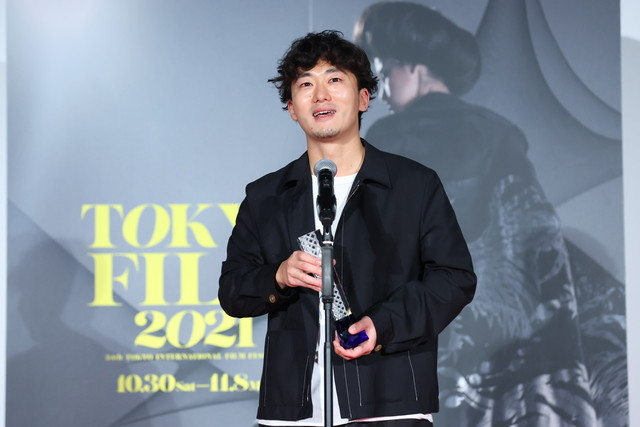
Jury President Isabelle Huppert then took to the stage to say: “Before we present the awards, the jury would like to extend a Special Mention to the film Just Remembering by Matsui Daigo, for its delightful exploration of young adults in Tokyo, with charming chemistry between the two lead characters as exhibited by Ikematsu Sosuke and Ito Sairi.”
Juror Aoyama Shinji, announcing the Award for Best Artistic Contribution, commented: “Filmmaking requires a variety of technical skills and this award is for excellence in technical skills. Filmmaking improves over time, and it has recently been diversifying. Crane Lantern was made by a single artist who did most of the technical work by himself, and this is proof of technological diversification.”
Crane Lantern director Hilal Baydarov appeared via video to say: “I just got an email that my film won the Award for Best Artistic Contribution. When I started making film, I showed the first one to my Mom, and my Mom watched the film and told my Dad that there is nothing inside the film, no story, no acting, nothing. There is just the image and the sound. She told me that there is a spirit in your film, a special spirit. Almost 10 years have passed, and I haven’t heard any new sentences. Everybody, the audiences who watch my films all think that there is nothing in my film, but just a spirit, the image and the sound, that’s all. I think it is an important thing in cinema, because it is very easy to find a thousand films, but it is almost impossible to find even three filmmakers who have spirit. Thank you very much. I want to thank the jury and of course our dear Shozo Ichiyama-san, who gave me a chance to show my film in beautiful, beautiful Tokyo and to amazing people. Arigato, thank you very much.”
Juror Sebu Hiroko then announced the Best Actor Award, saying, “We were impressed with the energy and the charm of the four leading cast members in this film. Although they were displaced from their homes due to modernization and capitalism, through their passion for music, they find comfort in and friendship with each other. Their chemistry is endearing and elevates the film above loss and grief.”
Four men—Amir Aghaee, Fatih Al, Bariş Yildiz, Onur Buldu— shared the Award for Best Actor for their ensemble work in The Four Walls (Bahman Ghobadi, director). Appearing via video, Aghaee said: “I would like to express my sincere gratitude to the jury members who have chosen [us] for this award, and I’m so grateful to Roger Waters, who gave me support and believed in me. I wish Bahman, the wandering director, can one day return to his country and make the films he loves. I would also like to thank our producer, Gökçe, for his faith and support. Thank you Funda, Fatih, Bariş and Onur, the actor team, for embracing me, an Iranian. When I was studying Turkish, I never thought that one day I could use Turkish in such a valuable way. I would like to dedicate this award to all the actors in Turkey. Thank you very much.”
Isabelle Huppert then mounted the stage again to announce the Best Actress Award, saying: “It is always very moving when you hear an actress with a voice of her own, a body language of her own, something unique. This is what struck me about Julia Chávez from the very first minute in the wonderful film The Other Tom. She delivers an unsentimental as well as deeply touching performance. A kind of non-acting performance which makes her so true, so evident. In fact, she doesn’t act, she does better than this: she just is. If the mission of an actor is to transmit the truth, then Julia Chávez clearly accomplishes that mission.”
Julia Chávez then appeared on video to say: “I want to first of all thank everybody at the Buenaventura productions, and especially Rodrigo Plá, Laura Santullo and Gaby, and all of the assistants who helped. Pricila, my personal assistant, who always takes care of me, making sure that I get to the set on time. I thank everybody who made this film possible, it took a lot of work. Everybody came together and put their part and did it. I didn’t expect to win an award. I am so grateful for everything and everyone. And I would like to thank my lord Krishna, who has been so merciful to me. I can’t believe I won an award, it was totally unexpected. I would also like to thank Israel. He is such an amazing actor. He is so talented at his young age. His parents are also really cool, and that is why he is such an epic part and a great actor. I want to also thank Tokyo International Film Festival. Thank you for the award, I appreciate it.”
Juror Chris Fujiwara announced the Best Director Award, Darezhan Omirbaev (Poet [Akyn]), and commented: “The jury chose Mr. Omirbaev because we were so impressed by the artistic personality that he expresses so vividly in this film, with the freedom of narrative that he allows himself, and the great mastery and maturity with which he reflects on the situation of cinema among the other arts in contemporary society. It’s a film that speaks very powerfully to all of us who care about the arts, about what the arts bring to humanity and about the place of film in the world.”
Darezhan Omirbaev then appeared via video, expressing: “My deepest thanks go to the Tokyo audience for our film and to the jury, which appraises it with such a high award. As for everything in this world, only time will give it a final evaluation. But before time does its work, it was extremely precious to share our film in such a forum. I also want to note such honor is not only mine, but is meant for our entire film crew, and for Kazakhfilm studio. It gives us tremendous strength to pursue our work. Thank you very much. Arigato.”
Juror Lorna Tee, announcing the Special Jury Prize, noted: La Civil is a film exploring the devastating effects of the cartels in Mexico, which brews a storm of violence, fear, distrust and a complete upheaval in the lives of ordinary people in the country. The director and scriptwriter have masterfully crafted a narrative that gives us complex characters and everyone is complicit in the unending cycles of violence and loss. It is an accomplished first feature by a director not afraid to give us a film based on true stories that had taken many lives in a country torn apart by drugs and violence. We hope, as the director does, that the film will shed more urgency on the situation and that the conflict will find resolution and redemption for everyone involved.
La Civil director Teodora Ana Mihai appeared via video to say: “I received the wonderful message from Tokyo that I won the Special Jury Prize. I want to thank the festival for this opportunity, and Jury members for giving us this honor. La Civil has been a film that I’ve worked on for almost 7 years, and is a film very dear to my heart. Its on a subject matter is quite delicate and timely in Mexico today. It is very important that international audiences see this and talk about and debate about the issue. Thank you very much again for the honor.”
Jury President Isabelle Huppert then announced the winner of the Tokyo Grand Prix, The Governor of Tokyo Award, Vera Dreams of the Sea (Kaltrina Krasniqi, director), saying “It is simultaneously a touching portrait of a woman grappling with the death of her husband and a commentary into the structures of patriarchy that strangles those who do not participate in the deep-set rules of the game set by men. The director deftly navigates the story of Vera, who is saddled with the baggage of history of a country, that allows for a quiet but insidious threat of violence to be inflicted upon individuals who are seeking for change in the society that they live in. The personal and the collective collide in a confident and profound manner in the film, brought forth by an assured direction and powerful performances in a film that adds to the amazing array of films by a courageous new generation of female filmmakers from Kosovo.”
Kaltrina Krasniqi, director of Vera Dreams of the Sea [Vera Andrron Detin], appearing via video, commented: “It was in September that I was notified that my first feature, Vera Dreams of the Sea, is part of the International Competition in Tokyo International Film Festival. I felt so honored by this selection. First of all, because Tokyo and Japan is the country of my dream and my dream cinema. Secondly, because Kosovo has never been part of this festival before. When I got the news this morning that the film has been awarded the Grand Jury Prize, I was screaming, laughing and crying from joy. Thank you so much for this honor, this recognition. Thank you to the jury and to my team, cast and crew who have worked very hard together with me to bring this story to life. Thank you, Tokyo. Thank you, Japan.”
Arber Mehmeti, Charge d’Affaires ad interim, Embassy of the Republic of Kosovo in Tokyo appeared on stage to accept the award for Krasniqi. Ushioda Tsutomu, Vice Governor of Tokyo presented the award on behalf of Tokyo Governor Koike Yuriko, and read the following message from her: “I would like to extend my congratulations to all the award winners, including director Kaltrina Krasniqi’s Vera Dreams of the Sea, which won the Tokyo Grand Prix. This film festival, celebrating its 34th anniversary, has moved its venue to the Yurakucho-Hibiya-Ginza area this year. I am very pleased that the event is held in this area, which has a long tradition as a cinema town. Art culture is an essential element of a city’s sustainability and it supports people’s minds and enrich them. Film, in particular, transcends national borders and languages to convey culture and fascination, or to show human life. It is a medium that can evoke many people’s sympathy and encourage mutual understanding. Through this film festival, we will further enhance the power of art culture and disseminate Tokyo having full of various charms, to the world.”
Isabelle Huppert then delivered closing remarks. “On behalf of the jury, I would like to say a few words about the Competition,” she began. “When I look back over the 15 films we saw, one of my first impressions is of great diversity. We were confronted with works by both established artists and new voices, representing various communities in different countries of the world. We could see the present situation of societies, together with the backgrounds of these situations. Again and again, I was struck by the modernity of the images of society that the films offered. In the past, a folkloric view of cultures has often been prevalent in world cinema, but this was not the case in Tokyo this year. The Competition gave us many portrayals of women. The protagonists of Vera Dreams of the Sea, La Civil and The Other Tom, all face overwhelming difficulties: corruption, crime, violence, abuse and neglect. Each film shows that these problems belong to an entire social system and the legacy of a past that continues to oppress people. Yet it is very striking that none of the three protagonists is shown as a victim. Each of these women becomes able to recognize and confront her enemy. Finally, whether they win or lose their fight, they leave these films looking toward the future. It has been a pleasure to explore the world with these 15 films, and an honor to be entrusted with the task of deciding these awards. Thank you.”
In his closing remarks, TIFF Chairman Ando Hiroyasu said, “After what seems like a long 10 days, the curtain has come down on the festival. We were fortunate to be blessed with beautiful autumn weather except for the second day, and I am happy to say that the venues in our new location were quite lively. The films seem to have been well-received, and I look forward to hearing your opinions about this year’s festival, so we can reflect on them deeply as we prepare for next year’s edition. A prominent French critic who joined us this year sent me this message: “I am convinced that what the Tokyo International Film Festival is aiming to do is important not only for the Japanese film industry, but also for those who love film, from the perspective of film diversity, creativity and its link to the world.” I will take these words to heart as we move forward. Last but not least, I would like to express our sincere gratitude to Ms. Isabelle Huppert and the members of the jury, to the organizing committee, government agencies, sponsors, the media, volunteers and above all, the audience for supporting the festival. The 34th Tokyo International Film Festival is hereby closed.”
At a press conference following the Closing Ceremony, the Competition Jury Members were asked for brief remarks. Said Jury President Isabelle Huppert (in French), “Film festivals are always a journey, and when I was watching the films, I was able to go to countries where I’ve never been. I believe the mission of film is to convey what’s going on in this world. When I looked at this year’s diverse selection, I felt like it really exceeded my expectations. Because of the diversity on this panel, I wondered whether we would clash during deliberations. But I’m very happy with what we accomplished; the diversity of our tastes are reflected in what we chose. I think TIFF has succeeded in its ambitious mission and its diverse selection. It’s wonderful that TIFF could be held physically during the pandemic because we need cinema. I would like to thank my fellow jury members.”
Aoyama Shinji noted, “I’ve been a jury member at several international film festivals, but it’s been a while. I had time to discuss and share my thoughts with my fellow jury members, and this has been the best experience I’ve ever had. We all hit it off and got along really well, and it was a great experience.”
Said Chris Fujiwara, “The deliberations were fascinating. I’ve been on many film festival juries and this was one of the most rewarding experiences I’ve had, because I respect everyone so much. In all ways, it was a great experience for me.”
Lorna Tee commented, “We had a good time watching the films together. It was a special experience for me, one I’ll never forget, because I’ve been in a [pandemic] bubble. The human connection, being able to see the films in a cinema together with the audience, after the process of being online from last year, has been delightful. I’m also excited about the changes that are taking place at TIFF, and the two Japanese films we saw. It was great to meet the wonderful people on the jury and experience Tokyo in a special way.”
Sebu Hiroko noted, “I’ve had no experience being part of a film festival, other than working as a staff member many years ago. I was wondering if I would fit in with this panel, but when I started watching the films, I decided to let that all go. When we started talking about the films together, I really enjoyed it. The deliberation was tough, but I learned a lot from the process.”
One journalist asked why a non-professional actress received the Best Actress Award (Julia Chávez, The Other Tom). Huppert responded, “For me, there is no professional and nonprofessional, and that’s the reason why this actress was so good to my eyes. In fact, she doesn’t act, and that’s why she’s so good. I usually prefer amateurs over professionals because there is a notion of innocence, and the notion of professionalism is not necessarily convincing. I didn’t know she was not a professional, but she had this little something that made her so particular, so unusual. She [acts] with deep comprehension of the situation, with something so touching that emerges in the relationship with her child.”
Tee added, “We had a few deliberations for every film, going over the filmmaking, the mise-en-scéne, the social commentary. It’s a coincidence that all three films that won awards were about mothers. But they were women who took charge of their lives, they didn’t view themselves as victims. There was something so powerful about the films and we embraced that. Like the audience, I fell in love with the actress and actor of Just Remembering, Ito Sairi and Ikematsu Sosuke.”
Audience Award-winning and Special Mention recipient Matsui Daigo, director of Just Remembering, then appeared to discuss winning the awards. “I haven’t been fortunate enough in the past to win awards like this,” he said. “I always made excuses that if I did win awards, I wouldn’t be able to make films anymore, so I’m extremely happy and grateful to all those who supported the filmmaking process. When we learned we would be in the TIFF Competition, my colleagues told me not to come back emptyhanded. I couldn’t sleep last night, worrying about what I would say if I won something.”
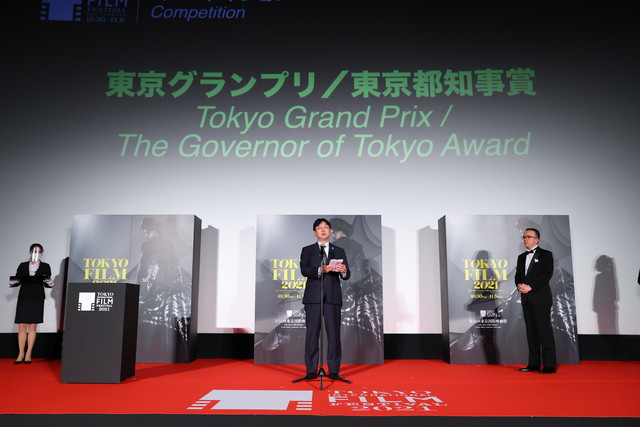
“It brings me a lot of joy to win the Audience Award, because I think a film isn’t complete until it’s seen by an audience, and this means that they enjoyed it. I remember watching the closing ceremony at TIFF the last three times I was here, and going home afterward. I think my route home tonight might be different from those times.
“I haven’t yet spoken to my actors, but Ms. Ito has been expressing her pleasure on social media. Mr. Ikematsu mentioned when we got into TIFF that he’d be really happy if the film got the Audience Award. He made a surprise appearance during the Q&A after our world premiere in TIFF, even though he’s in the middle of shooting.”
34th Tokyo International Film Festival 2021
Closing Events












